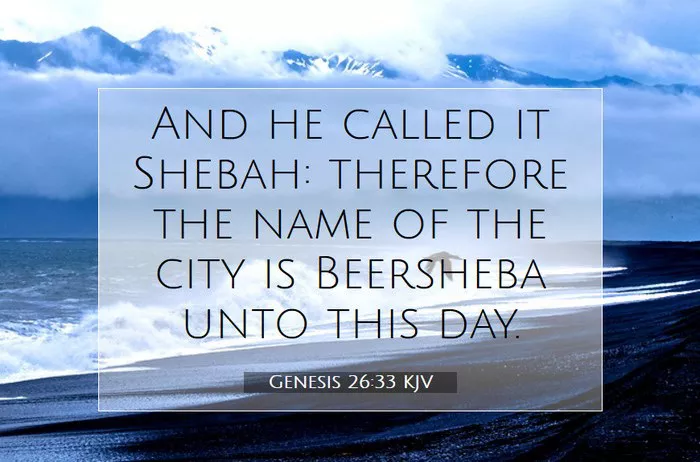Read the Daily Bible Verse – Genesis 26:33 To Strengthen Your Spiritual Journey.
The Book of Genesis is foundational to understanding the themes, promises, and narratives that run throughout the Bible. In Genesis 26, we encounter Isaac, the son of Abraham, as he navigates God‘s promises amidst trials and blessings. Genesis 26:33, in particular, carries profound meaning about God’s provision, the establishment of relationships, and the enduring blessings promised to Abraham’s lineage. To understand this verse fully, we must explore its context, analyze its meaning, and consider its application in our lives today.
The Context of Genesis 26:33 (KJV)
The context surrounding Genesis 26:33 is essential for understanding its depth. Genesis 26 recounts Isaac’s journey through the land of Gerar during a famine. Like his father Abraham, Isaac faced adversity in his travels, but he continued to experience God’s faithfulness. In this chapter, God reaffirms His promises to Isaac, stating that He will bless him and multiply his descendants. However, Isaac’s journey is also marked by tension with the Philistines, specifically over wells, which were vital resources in the arid regions.
After settling in Gerar, Isaac re-digs the wells his father Abraham had previously dug. However, conflicts arise as the Philistines repeatedly claim the wells Isaac’s servants find. In Genesis 26:22, Isaac eventually finds a well without opposition, which he names “Rehoboth,” meaning “room” or “broad places,” symbolizing that God has made space for him to flourish.
In Genesis 26:33, Isaac names another well “Shebah,” meaning “oath” or “seven,” which is why the nearby city is called “Beersheba” to this day. The well’s naming symbolizes a binding promise, emphasizing God’s ongoing provision and relationship with Isaac.
The Meaning of Genesis 26:33
Genesis 26:33 (KJV):
“And he called it Shebah: therefore the name of the city is Beersheba unto this day.”
The verse reveals Isaac’s naming of the well as “Shebah,” a name associated with the idea of an oath or covenant. The term itself stems from the Hebrew root “shaba,” meaning “to swear an oath,” or “to seven oneself,” denoting the sealing of a sacred commitment. This act symbolizes more than just naming a geographical location; it represents Isaac’s acknowledgment of God’s faithfulness and the establishment of peace and provision through divine blessing.
Isaac’s choice to name the well “Shebah” also reflects his understanding of God as a covenant-keeping God. This name serves as a public acknowledgment that God had faithfully provided, despite challenges. The well, which could have been a source of division and strife, becomes a sign of divine blessing and God’s unfailing promises to His people.
Genesis 26:33 Application in Life
The application of Genesis 26:33 in the Christian life lies in understanding and trusting God’s covenant faithfulness. Just as Isaac trusted that God would provide for him, we, too, are encouraged to rely on God’s promises. The wells in this narrative represent more than water sources; they represent life-giving provision, spiritual sustenance, and the faithfulness of God.
Isaac’s experience challenges us to stand firm and trust that God will provide even when circumstances seem challenging. Each of us may face “wells” of conflict or strife, but through patience and faith, we may find a “Rehoboth” or a “Shebah,” signifying God’s providence and peace. This verse reminds us to hold on to God’s promises and to remember that He will provide a way.
Comparison with Other Biblical Texts
Genesis 26:33 can be compared with other biblical texts that emphasize God’s covenant faithfulness and the significance of naming. For instance:
1. Genesis 21:31
This verse recounts Abraham naming the place Beersheba after making a covenant with Abimelech. Both Abraham and Isaac experienced God’s provision and blessings, which led to the establishment of a sacred location named in recognition of God’s faithfulness.
2. Exodus 3:15
When God introduces Himself to Moses as the “I AM,” it signifies God’s eternal and covenantal nature. Genesis 26:33 similarly underscores God’s ongoing, unchanging faithfulness, now seen through His promises to Isaac.
3. Psalm 23
David describes God as a shepherd who provides, even “in the presence of my enemies.” Like Isaac, who finds peace despite the Philistines’ opposition, believers are reminded of God’s providential care amid adversity.
See Also: What Does Genesis 26:32 Mean?
Modern-Day Relevance
The relevance of Genesis 26:33 extends to our lives today in profound ways. In our modern context, we may not encounter literal wells, but we do face challenges in life that require resilience and faith in God’s promises. Isaac’s experience encourages us to seek God’s provision and trust that He will make a way even when resources seem limited.
The symbolism of “Shebah” reminds believers to honor and recognize God’s faithfulness in their own lives. Establishing places or practices of remembrance—whether through prayer, journaling, or personal reflection—can help us stay rooted in God’s promises and celebrate His goodness even amidst trials.
Conclusion
Genesis 26:33 may appear to be a simple statement about naming a well, but it carries deep theological and practical significance. It reflects Isaac’s acknowledgment of God’s faithfulness, the covenantal relationship between God and His people, and the importance of recognizing divine provision in the midst of adversity. As Christians, we can draw encouragement from this passage, learning to trust God, honor His faithfulness, and remember His provision in all circumstances.
Genesis 26:33 Commentary
Many biblical commentators view Genesis 26:33 as a powerful illustration of God’s unwavering faithfulness and the concept of sacred memory. Through the naming of “Shebah,” Isaac marked a place that became a lasting testimony of God’s blessing and peace. Commentators often emphasize the symbolism of wells in biblical texts, noting that they signify life, community, and divine provision. By establishing Beersheba, Isaac not only solidified his relationship with the local inhabitants but also commemorated God’s ongoing covenant with Abraham’s descendants. This verse serves as an enduring reminder that God’s promises are reliable and that His provision is constant, no matter the external circumstances.
Related topics:


